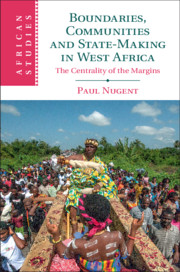Book contents
- Boundaries, Communities and State-Making in West Africa
- African Studies Series
- Boundaries, Communities and State-Making in West Africa
- Copyright page
- Dedication
- Contents
- Figures
- Maps
- Tables
- Acknowledgements
- Abbreviations
- 1 Centring the Margins
- Part I From Frontiers to Boundaries
- Part II States and Taxes, Land and Mobility
- Part III Decolonization and Boundary Closure, c.1939–1969
- 8 Bringing the Space Back In
- 9 The Vanishing Horizon of Senegambian Unity
- 10 Forging the Nation, Contesting the Border
- Part IV States, Social Contracts and Respacing from Below, c.1970–2010
- Conclusion
- Bibliography
- Index
- African Studies Series
10 - Forging the Nation, Contesting the Border
Identity Politics and Border Dynamics in the Trans-Volta
from Part III - Decolonization and Boundary Closure, c.1939–1969
Published online by Cambridge University Press: 08 June 2019
- Boundaries, Communities and State-Making in West Africa
- African Studies Series
- Boundaries, Communities and State-Making in West Africa
- Copyright page
- Dedication
- Contents
- Figures
- Maps
- Tables
- Acknowledgements
- Abbreviations
- 1 Centring the Margins
- Part I From Frontiers to Boundaries
- Part II States and Taxes, Land and Mobility
- Part III Decolonization and Boundary Closure, c.1939–1969
- 8 Bringing the Space Back In
- 9 The Vanishing Horizon of Senegambian Unity
- 10 Forging the Nation, Contesting the Border
- Part IV States, Social Contracts and Respacing from Below, c.1970–2010
- Conclusion
- Bibliography
- Index
- African Studies Series
Summary
In this chapter, I perform a parallel exercise to that of Chapter 9 with a focus on the trans-Volta and the Gold Coast. I revisit the question of why the Ewe/Togoland unification movement, which did enjoy a groundswell of popular support in the 1940s and 1950s, ultimately fell short of fulfilling its objectives and why there was actually a hardening of the boundary in the decade after the independence. This entails a close investigation of local, national and trans-boundary entanglements. The Ewe/Togoland case is ostensibly different not merely because there was a popular discourse that took aim at existing borders, but also because ethnicity was central to the political debate: that is, the border was initially framed as a specifically Ewe problem, whereas the Senegal–Gambia border was rarely articulated as a matter affecting the Mandinka or Jola as ethnic collectivities. But the difference should not be exaggerated for the reason that the unification movement after 1951 focused on upholding the historic integrity of the two Togolands, which was comparable to the insistence that the Senegambia represented an organic whole. Part of the reason for the discursive shift was that the Ewe ethnic category came to be contested by its notional constituency, while many non-Ewes, including the Agotime and the Central Togo minorities, needed to be brought into the fold. The eventual outcome was that British Togoland was swallowed whole by Ghana, whereas French Togoland entered the world of independent nations as a micro-state with an uncertain future. The rupture between the political leaders in the successor countries was more rancorous than in the Senegambia, which helps to explain why so little effort was devoted towards promoting cross-border co-operation in the decade that followed. However, this also had much to do with the sedimentation of quite distinct social contracts in Ghana and Togo. Much like in the Senegambia, these were contingent on bordering processes that played out differently on the two sides of the line.
- Type
- Chapter
- Information
- Boundaries, Communities and State-Making in West AfricaThe Centrality of the Margins, pp. 357 - 394Publisher: Cambridge University PressPrint publication year: 2019



